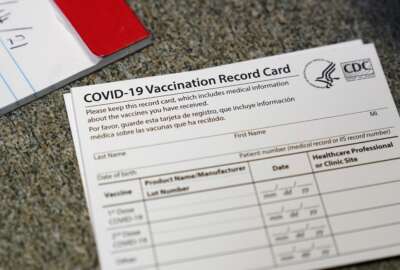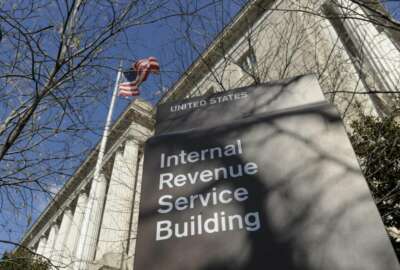With mandates in limbo, White House has new vaccine guidance for agencies
In today's Federal Newscast, the Safer Federal Workforce Task Force is telling agencies to start asking employees whether they’re up to date with their COVID-...
To listen to the Federal Newscast on your phone or mobile device, subscribe in PodcastOne or Apple Podcasts. The best listening experience on desktop can be found using Chrome, Firefox or Safari.
- The Navy has started firing sailors for refusing to get vaccinated. The Navy released 23 sailors for not getting the mandatory COVID-19 vaccination. The sailors mark the first in the service to be terminated for refusal to get the shots. Active duty sailors were supposed to be fully vaccinated by Nov. 28. The Air Force and the Marine Corps have already started firing recalcitrant service members as well. The Marine Corps has kicked out more than 300 troops since the deadline passed. The Army still remains the only service that has not separated anyone for refusing to get vaccinated. (Federal News Network)
- The Navy Reserve expects to discharge about 2,000 sailors for refusing the COVID-19 vaccine. The reserve component is about 95% vaccinated, but Vice Admiral John Mustin, the chief of the Navy Reserve, said he expects a large number of the remaining members will need to retire or be involuntarily separated over vaccine compliance issues. None of those separations have happened yet. The broader Navy announced its first vaccine-related discharges earlier this week. Twenty-three active duty sailors were removed for refusing shots. (Federal News Network)
- The Navy is shortening its isolation periods for sailors who were sick with COVID-19. Under the new guidance, sailors will only need to quarantine for five days if they are sick and then wear a mask for another five days after symptoms resolve. The policy is similar to what the Centers for Disease Control and Prevention released at the beginning of the Omicron spike. The Navy has seen multiple outbreaks on its ships, sometimes hindering their operational capacity.
- The Safer Federal Workforce Task Force is telling agencies to start asking employees whether they’re up to date with their COVID-19 vaccines. The task force said that includes a COVID-19 booster shot, or an additional primary vaccine dose for individuals who are immunocompromised. The task force is also telling agencies that employees who come into close contact with a confirmed COVID case can take weather and safety leave, if they’re unable to telework. But employees should use sick leave, annual leave or other forms of earned paid time off if they’re confirmed or presumed to have COVID and can’t telework.
- Agencies are seeing benefits from bringing in private sector technical and scientific experts for short term assignments. But it’s unclear how often they are taking advantage of this personnel mobility program. The Government Accountability Office reviewed four agencies: the Defense Department, General Services Administration, NASA and Energy Department, and found these private sector experts accounted for less than 1% of their workforces. GAO also found the Office of Personnel Management doesn’t have complete or accurate data to track the mobility program use so it’s unclear how often agencies are using it to address critical skill gaps.
- New companies are joining a signature public-private cyber partnership. The Joint Cyber Defense Collaborative has six new members. Tenable, Juniper Networks, Secureworks, IBM, Trellix and Splunk all joined the JCDC. The program is run by the Cybersecurity and Infrastructure Security Agency. The JCDC launched in August as a place where agencies, technology companies and cybersecurity firms can share information about cyber threats and plan out the response to critical incidents. CISA Director Jen Easterly said the JCDC has played a crucial role in helping the agency respond to the Log4J vulnerability.
- The Biden administration is looking to shore up cybersecurity in the water sector. The Environmental Protection Agency and the Cybersecurity and Infrastructure Security Agency will lead a new “Water Sector action plan.” EPA and CISA will work with water utilities to deploy monitoring technology on their industrial control systems. The agencies will also work with utilities to share information about cyber threats and incidents. The new focus on water systems follows similar initiatives for electric utilities and natural gas pipeline operators.
- The State Department said its worldwide email outage yesterday isn’t tied to malicious activity. Several sources confirmed the State Department sent a bulletin to employees Thursday morning notifying them that the agency was experiencing a worldwide email outage, and that it was dealing with issues from a Microsoft patch meant to fix general bugs. State Department spokesman Ned Price told reporters in a press briefing that the agency’s investigation into the email outage remains ongoing. “We have absolutely no indication that this outage has anything to do with malicious activity. In fact, we believe there is a technical explanation for it.” (Federal News Network)
- Another delay for the $40 billion CIO-SP4 governmentwide acquisition contract. The National Institutes of Health IT Acquisition and Assessment Center extended the deadline for bids for its $40 billion dollar CIO-SP4 vehicle. The new due date of Feb. 11 comes amid complaints and problems with the proposal submission portal that it is requiring vendors to use. NITAAC required all contractors who previously submitted proposals in August to resubmit bids through a third-party portal by today at 5 pm. But vendor sources say the portal is struggling to keep up with demand causing problems and delays. (Federal News Network)
- The demand from Congress for the IRS to do more in response to its backlog of unprocessed tax returns is growing. Nearly 200 representatives are asking Treasury Secretary Janet Yellen to expedite processing of amended tax returns at the IRS, and to provide Congress and the Taxpayer Advocacy Service with more regular updates on progress made. Lawmakers also ask the IRS to halt automated collections, and to only resume collections until 90 days after the end of the filing season.
Copyright © 2024 Federal News Network. All rights reserved. This website is not intended for users located within the European Economic Area.
Eric White
Eric White is news anchor and Federal Drive producer at Federal News Network.
Follow @FEDERALNEWSCAST
Related Stories
IRS takes steps to avoid tax return processing delays as filing season starts
Related Topics
All News
CIO-SP4
COVID-19 vaccine mandate
Defense
Defense News
Federal Drive
Federal Newscast
filing season
Government Accountability Office
IRS
Janet Yellen
Management
National & World Headlines
Navy
Navy Reserve
NITAAC
Safer Federal Workforce Task Force
taxes
telework
Tom Temin
Workforce
Workforce Rights/Governance






